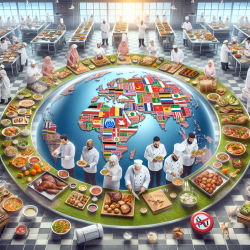Introduction to Global Halal Standards
The demand for ethical foods is on the rise, and halal foods are a significant part of this trend. However, the variation in halal standards across the globe presents challenges for practitioners, consumers, and food producers. The research article "Global Trends in Halal Food Standards: A Review" highlights these disparities and underscores the need for standardization and harmonization in the halal food industry.
Key Findings from the Research
The study conducted a critical analysis of various halal standards, including those from Pakistan, Singapore, Indonesia, Malaysia, and other countries. It found that while some commonalities exist, differences arise from various Islamic schools of thought, particularly concerning controversial issues like stunning, slaughtering, and labeling requirements.
Improving Practitioner Skills
Practitioners can enhance their skills by understanding the global landscape of halal standards. Here are some actionable steps:
- Stay Informed: Regularly review updates from major halal certification bodies and understand the differences in standards.
- Engage with Experts: Collaborate with scholars and experts in Islamic jurisprudence to gain insights into different schools of thought.
- Promote Standardization: Advocate for the adoption of international standards, such as those proposed by the Organization of Islamic Cooperation (OIC), to ensure consistency.
- Leverage Technology: Utilize blockchain and traceability technologies to ensure transparency in the halal supply chain.
Encouraging Further Research
While the current research provides a comprehensive overview, further research is essential to address the challenges faced by halal certification bodies. Practitioners are encouraged to explore:
- The impact of different halal standards on international trade.
- The role of consumer awareness in shaping halal certification practices.
- The potential of digital platforms in enhancing consumer understanding of halal standards.
Conclusion
Understanding the global trends in halal food standards is crucial for practitioners aiming to improve their skills and contribute to the halal food industry's growth. By staying informed and advocating for standardization, practitioners can help bridge the gap between diverse halal standards and meet the growing demand for ethical foods.
To read the original research paper, please follow this link: Global Trends in Halal Food Standards: A Review










